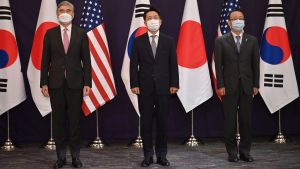Japanese More Confident than Americans in US Power

New Chicago Council-Japan Institute of International Affairs data find the Japanese public has greater confidence in US economic and military power than do Americans.
The January 6 insurrection at the US Capitol and the August 2021 US withdrawal from Afghanistan were widely assumed to have weakened the United States in the eyes of its allies, raised concerns about American commitments in Europe and Asia, and put the desirability of US leadership in doubt. However, a new survey report from the Chicago Council and the Japan Institute of International Affairs (JIIA) suggests those effects may have been overstated. Across a number of fields—US democracy, US strength vis-à-vis China, the desirability of US leadership in the world—Japanese are more bullish on America than Americans themselves.
Japanese Bullish on Democracy in America
The January 6 insurrection raised concerns at home and abroad about the health of American democracy. Those concerns are shared by many in the United States and Japan: a majority of Americans (52%) and a plurality of Japanese (46%) say American democracy has been temporarily weakened, but is still functioning. Yet Japanese are significantly more likely than Americans to see American democracy as healthy and functioning (26%, compared to 7% of Americans).
Japanese are also marginally more positive about democracy in the United States than they are about democracy in Japan. A combined 72 percent of Japanese view democracy in the United States as either healthy and functioning (26%), or only temporarily weakened (46%). When asked the same question about their own country, a slightly lower 67 percent of Japanese give an optimistic response, with 27 percent saying that their own country’s democracy is healthy and functioning and 40 percent believing that it is temporarily weakened.
No Afghanistan Hangover for Japan
Another potential blow to American reputation abroad came in the American withdrawal from Afghanistan. The ending of that longstanding US commitment, and particularly the chaotic scenes in Kabul during the final evacuations, could have led US allies to doubt the credibility of US commitments to use force on their behalf. To test this, the Chicago Council-JIIA survey ran a split-sample experiment testing whether wording that referenced the US withdrawal from Afghanistan would affect Japanese respondents’ views on how likely the US would be to militarily intervene in different conflict scenarios.
Yet contrary to the concerns of foreign policy commentators, mentioning the withdrawal seems to have no effect on Japanese expectations about American interventions. Instead, the most salient factor in Japanese expectations may be proximity to Japan: the Japanese public expects US intervention in all the presented scenarios set in Asia, but is more skeptical about US intervention in Europe.
America in the Lead?
If Japanese confidence in America has not been shaken, then what role would Japan like to see the US play internationally? The public is divided: half of Japanese (49%) say the United States should play a shared leadership role in the world, as do a majority of Americans (69%). Yet a significant proportion of the Japanese public (47%) would like to see a United States that is not simply one of several leading nations, but the dominant nation on the world stage—something only a quarter of Americans favor (23%). Few Americans (8%) or Japanese (5%) want the United States to play no leadership role at all in the world.
Japanese Confidence in American Military and Economic Power
Japanese are also notably more confident in American power than are Americans. While just under half of Americans (46%) say the United States is a stronger military power than China, two-thirds of Japanese (64%) see the United States as stronger. The difference is even more stark when it comes to American and Japanese evaluations of the economic balance of power. A majority of Japanese (54%) see the United States as the stronger economic power, compared to just a quarter of Americans (27%).
To be clear: these results, like all polls, are a snapshot of public attitudes at one point in time. Because we don’t have prior trends for these items, it’s impossible to say if they are higher or lower than they would have been in the past. Additionally, these surveys were conducted prior to Russia’s invasion of Ukraine in February 2022, and it is unclear how Japanese views of American credibility and commitment would be affected by the course of that conflict and America’s role in supporting Ukraine. However, it is nevertheless striking to see that Japanese today are often more confident in the United States than Americans are themselves.


Related Content
 Public Opinion
Public Opinion
New data from the Japan Institute of International Affairs and the Council offer insights on how publics in the United States and Japan view the relationship between their countries.
 Public Opinion
Public Opinion
In a shift from just a month ago, the Japanese public favors tough sanctions on Russia in concert with the US and Europe.
 Public Opinion
Public Opinion
American, Japanese, and South Korean publics see China as a more of a threat than a partner. Trilateral cooperation will be key to managing China's rise.